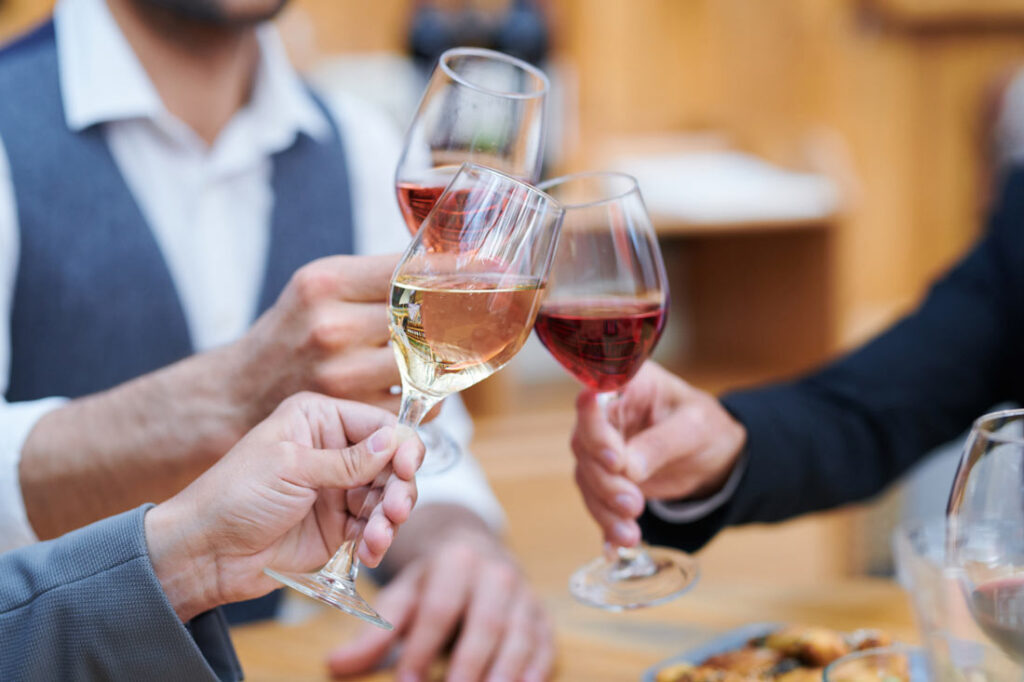Tales of holiday parties gone wild are often part of company lore. According to a recent BBC Worklife article, however, the workplace drinking culture may quickly be fading. What role does alcohol play today when doing business over lunch or celebrating after hours, especially in remote and hybrid workplace cultures? And will employees not get ahead if they opt to skip the booze or forgo attending an event entirely? Here are some key considerations to help you determine your approach to drinking with colleagues.
A new era of socialization: drinking with colleagues
With the demarcation between the personal and professional becoming blurrier over the last few years, it makes sense we’d also reassess the relationship alcohol and networking play in an employee’s ultimate success.
While socializing at work can boost team performance, improve worker well-being and protect against stress, alcohol and drinking culture may play a role in these types of social events.
Digital marketing specialist Cully Eisenbeis believes building networks and partnerships with colleagues, vendors, leaders and clients is a very important part of how he has built his career. As he’s gone from a single, recent college graduate to being in his late 30s and married with two children, he’s also seen a shift in others’ approach to drinking, as well as his own, while climbing the corporate ladder.
“As I have gotten older, it is much less about getting wasted with colleagues and more about having a couple of cocktails to relax,” he says. “Instead of crushing beers with interns, it is now about having a nice glass of wine or bourbon with leadership or close partners, or all having a few beers at a sporting event.”
Protocol for drinking around colleagues who don’t
While Eisenbeis will choose to have a few drinks in a social setting with co-workers, he’s seen more and more people who choose not to drink at all, or limit what they do drink.
“In fact, if I am with a colleague (or anyone really) that says they don’t drink or they have stopped drinking, I typically ask if it is okay if I have a drink,” he says. “I don’t want to make anyone uncomfortable or appear to be pushing them into something they have worked to get away from. It is less about the alcohol and much more about the non-work conversations. However, a few drinks can lead to some interesting ‘shop talk’.”
There have also been times when Eisenbeis has seen colleagues have a few too many, and he has probably done the same. While in your younger years, he says, you might tend to laugh off someone’s behavior, these days he mentions sometimes getting intense ‘hangxiety’ after a long night out with co-workers.
The good, the bad and the ugly of alcohol
In his song, Blame It, Jamie Foxx sings: “Blame it on the Goose / Gotcha feelin’ loose.” While a drink or two might calm nerves or hasten laughter among colleagues, we’ve all seen the potentially career-damaging or job-ending impacts drinking can have due to the consequences of alcohol consumption.
“I have seen colleagues get in arguments, hook up, tell the boss how it is and everything in between,” Eisenbeis says.
This Slate article highlights those on the other side of that line, who often fear they’ll be seen as uptight or not a team player if they don’t drink.
The first thing to realize? Drinking at a work event doesn’t have to be an all-or-nothing proposition. If you decide you would like to have a drink, this Yahoo article offers some helpful tips to ensure you behave responsibly, such as never drinking more than your colleagues, among a few other tips and strategies.
It also helps to have an understanding of how your body reacts to different types of alcohol, and to order accordingly. For example, beer has a lower average alcohol content than wine or liquor, which means you might be able to tolerate more and still feel in control. Or you might know that there is a marked difference in your behavior when you have two drinks versus one, so you preemptively plan to stick to one.
Are the days of liquid lunches over?
And what about those power lunches that used to be the stuff of legends? Eisenbeis doesn’t know of anyone these days that includes alcohol when meeting over the lunch hour with colleagues or clients.
“I think the idea of a liquid lunch in the corporate world is a thing of the past,” Eisenbeis says. “I can’t imagine going out for lunch, having a few drinks and then coming back to the office for the afternoon to have a one-on-one with one of my peers. That sounds awful and unprofessional. As much as I fancy myself as a Don Draper, I can’t imagine a time when it would be appropriate for me to have a drink at lunch on a Tuesday.”
As for work events or happy hours following the conclusion of the work day?
“Personally, I love a few good drinks with my colleagues and hope they enjoy a few with me,” Eisenbeis says.




